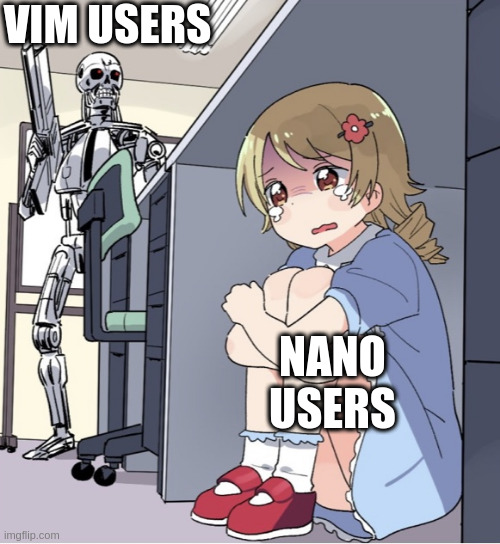this post was submitted on 02 Sep 2024
789 points (93.5% liked)
Linux
48003 readers
1049 users here now
From Wikipedia, the free encyclopedia
Linux is a family of open source Unix-like operating systems based on the Linux kernel, an operating system kernel first released on September 17, 1991 by Linus Torvalds. Linux is typically packaged in a Linux distribution (or distro for short).
Distributions include the Linux kernel and supporting system software and libraries, many of which are provided by the GNU Project. Many Linux distributions use the word "Linux" in their name, but the Free Software Foundation uses the name GNU/Linux to emphasize the importance of GNU software, causing some controversy.
Rules
- Posts must be relevant to operating systems running the Linux kernel. GNU/Linux or otherwise.
- No misinformation
- No NSFW content
- No hate speech, bigotry, etc
Related Communities
Community icon by Alpár-Etele Méder, licensed under CC BY 3.0
founded 5 years ago
MODERATORS
you are viewing a single comment's thread
view the rest of the comments
view the rest of the comments

is there not a single other person who uses helix?
WTF is helix?
https://helix-editor.com/
essentially a terminal modal editor (like vim), but instead of specifying the action to perform then what to perform the action on (like "yank 3 lines"), in helix you select first, then perform actions on the selection (like "these 3 lines, i want them yanked"). it's slightly better (according to others) because you get to see what you're going to change in the file so you don't accidentally delete 5 lines instead of deleting 4.
on top of that many features are builtin, like tree-sitter and lsp support, so you don't have to spend 5 hours looking for cool plugins and configuring everything to get started (my config file is only 50 lines of toml).
the downside is that there isn't support for plugins (yet), but there's already things like a file picker, more than 100 themes etc.
So similar to kakoune? I tried that for a while, but it was missing some features so I went back to vim/neovim.
I need to know vi anyway, because that is available everywhere (as part of busybox), so using vim/nvim for bigger systems just fits.
I gave it serious consideration when the death of Atom was announced and I was unsure where to move on to.
Looks like in the meantime a lot has been done (as far as I remember, TreeSitter and LSP weren't built in back then...? Not sure though), but the lack of a plugin system is still killing it for me.
TBH it looks like it has 75% of the features you want from a codeditor, which is much more than the use-case for Nano, but no way to go the remaining 25% of the way.
I'm still in mourning.
It was pretty great, wasn't it?
Although I must say. I eventually landed on neovim. Steep, steep learning curve, but now I would not switch back again.
I would look at that, but I bounced off VIM hard, so probably not for me.
Well I tried! I ended up using
microthoughHelix's editing model is so much better than vim's. I would probably use it if it was be closer to a drop-in replacement for vim. I really hope this neovide issue gains some traction because I don't think I can daily drive anything that isn't as smooth as neovide again.
I simply have too much vim config and muscle memory to ever leave vim
I'm trapped in a prison of my own making!
I like helix